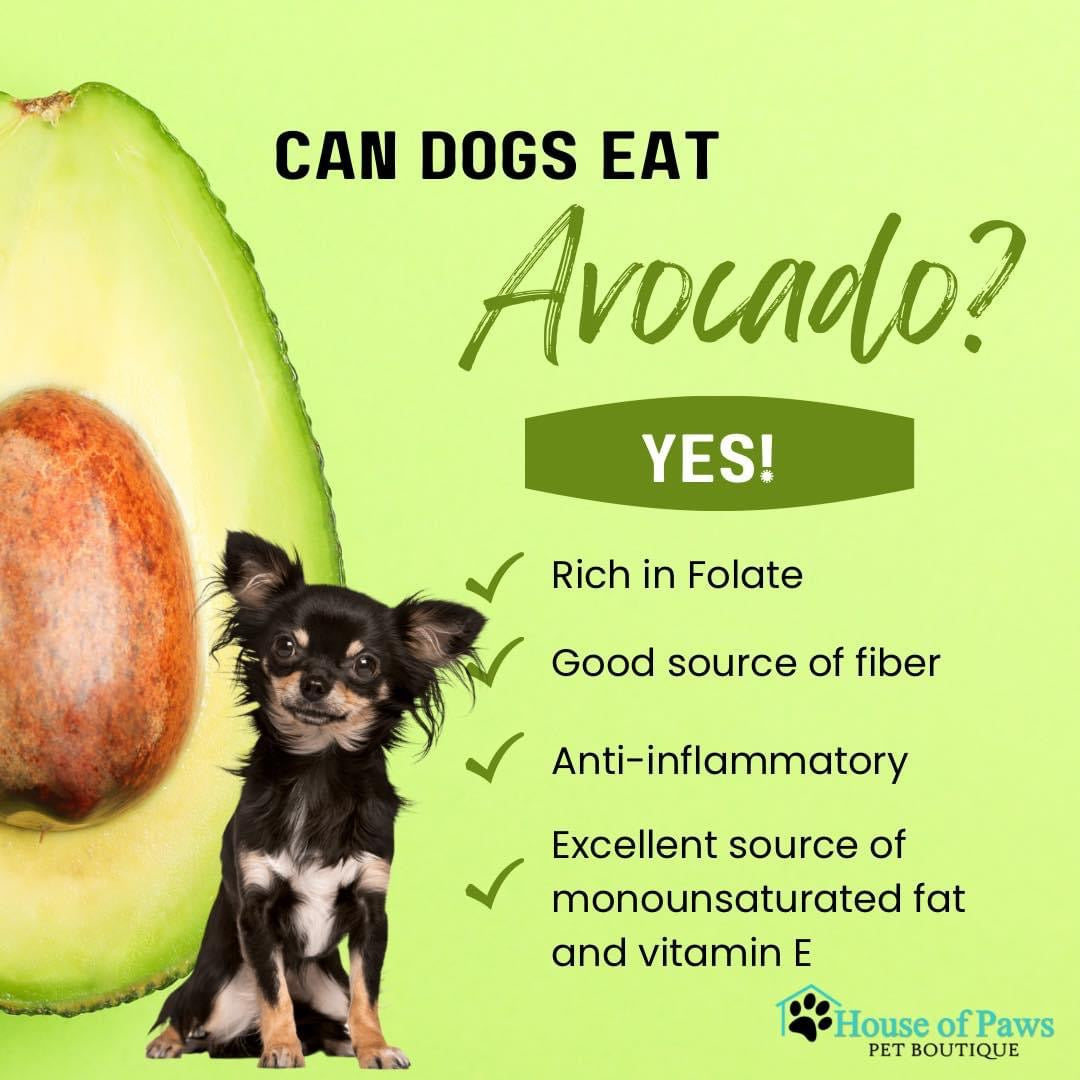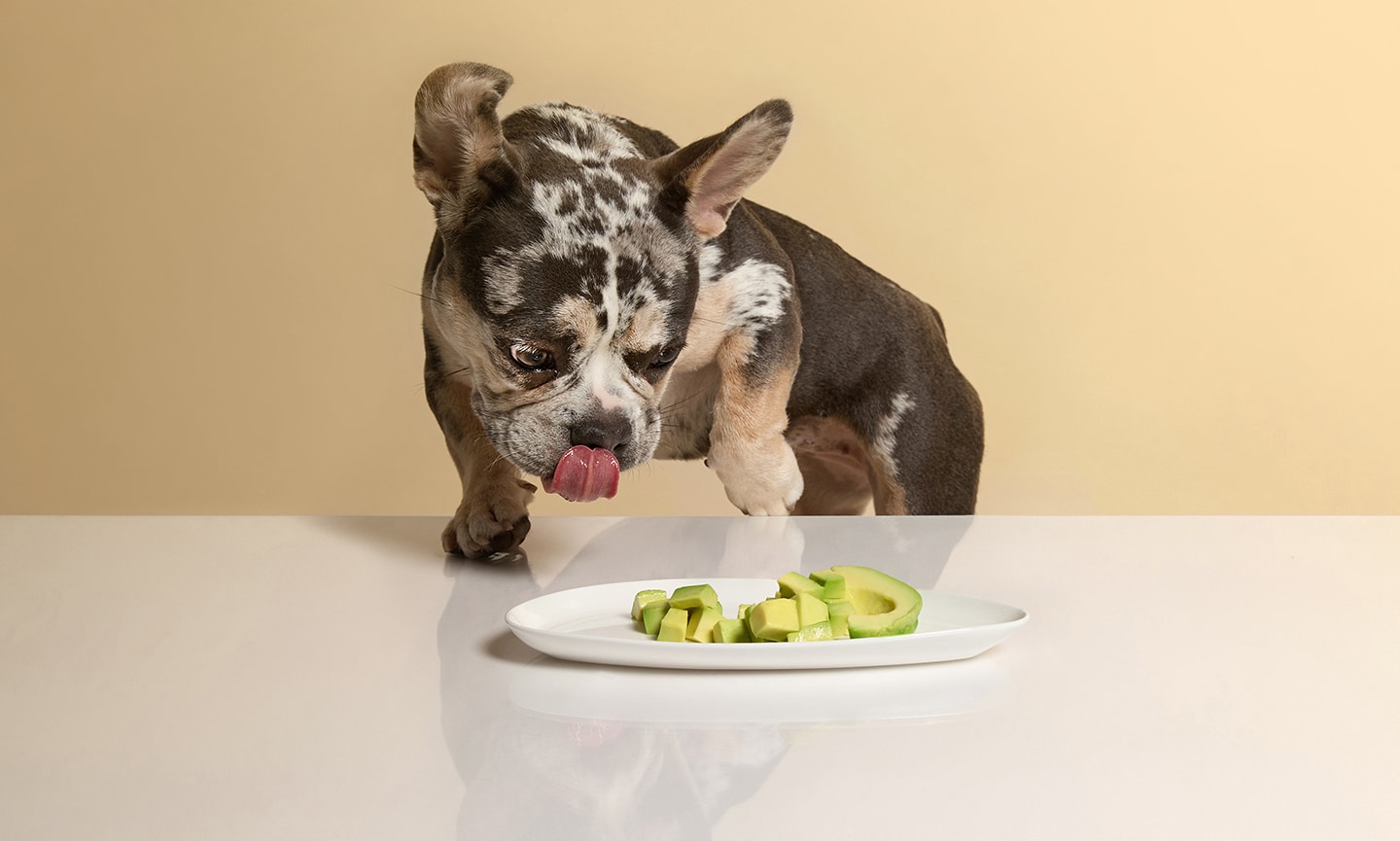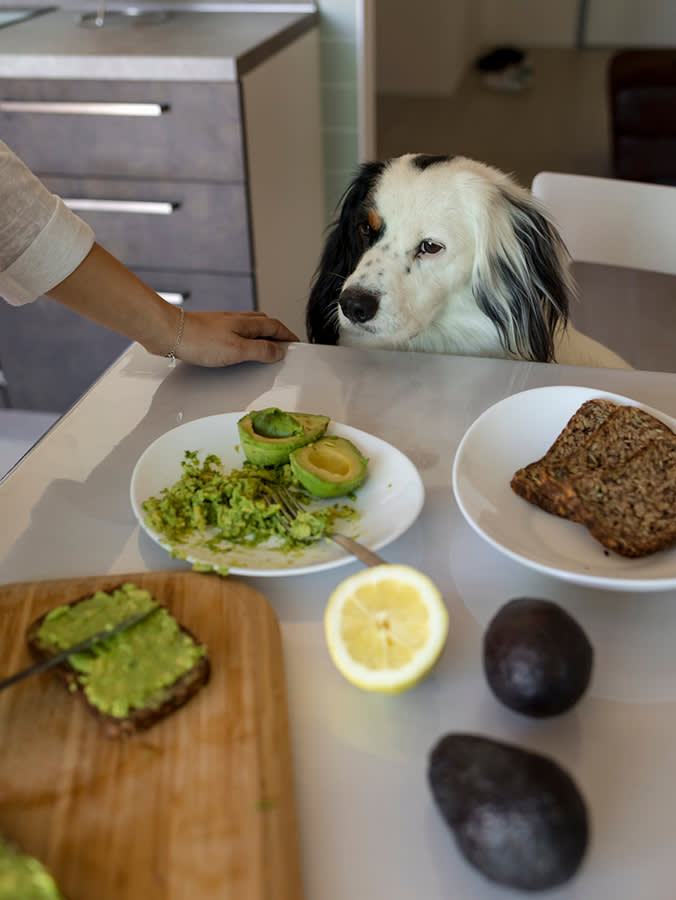No, dogs should not eat avocados. Avocados contain a toxin called persin.
This can be harmful to dogs. While avocados are healthy for humans, they aren’t safe for our canine friends. Pet owners often wonder which foods are safe for their dogs. Avocado is a common concern due to its popularity in human diets.
Many people enjoy avocados in salads or on toast, but what’s good for us isn’t always good for dogs. Understanding what foods are safe is crucial. It helps keep our pets healthy and happy. In this blog post, we’ll explore why avocados aren’t safe for dogs. We’ll also discuss the potential risks and symptoms to watch for. Keep reading to ensure your dog stays safe and healthy.

Credit: houseofpawsboutique.com
Avocado Nutritional Profile
Avocados are rich in healthy fats, vitamins, and minerals. Dogs should avoid eating avocados due to persin, a substance that can be harmful. Always consult a vet before introducing new foods.
Avocado is often touted as a superfood for humans, but what about our furry friends? Understanding the avocado nutritional profile can shed light on whether this creamy fruit is a suitable treat for your dog. While avocados are rich in nutrients, it’s essential to know which elements could benefit or harm your pet.Vitamins And Minerals
Avocados are packed with vitamins like vitamin E, vitamin K, and several B vitamins. These vitamins support your dog’s immune system and skin health. Minerals such as potassium and magnesium are abundant in avocados. They play a crucial role in maintaining healthy bones and muscles. Imagine your dog feeling energetic and strong after munching on a nutrient-rich snack. But here’s the twist: avocados contain persin, a fungicidal toxin that can be harmful to dogs in large quantities. You might wonder, is the risk worth the reward?Healthy Fats
The healthy fats in avocados are what make them a sought-after snack for humans. These fats can contribute to shiny coats and healthy skin in dogs. However, moderation is key. While healthy fats are beneficial, excessive consumption can lead to weight gain. Have you ever noticed your dog gaining weight unexpectedly? It could be the treats you’re offering. Balancing fat intake is crucial to maintaining your pet’s health. As you consider adding avocado to your dog’s diet, remember that every dog is unique. The nutritional benefits might vary from one dog to another. Would you be willing to experiment and observe the changes in your pet?Common Foods Dogs Should Avoid
Feeding your furry friend can be a delightful experience, but it’s crucial to know which foods are safe. Dogs can have sensitive stomachs and some foods are downright toxic. You might wonder, “Can a dog have avocado?” It’s a great question because avocados are among the many foods that should be off your dog’s menu. Knowing what to avoid can prevent a trip to the vet and keep your dog healthy and happy.
Toxic Foods List
Avocados contain persin, a toxin that can be harmful to dogs. While the flesh isn’t highly toxic, the pit, skin, and leaves are dangerous.
Chocolate is another no-go. It contains theobromine, which dogs can’t metabolize effectively.
Grapes and raisins can cause kidney failure. Even a small amount can be harmful.
Onions and garlic can lead to anemia. They damage red blood cells, causing weakness.
Macadamia nuts can cause vomiting and hyperthermia. They affect the nervous system.
Keep alcohol far away. It can lead to respiratory failure and even death.
Symptoms Of Ingestion
If your dog eats avocado, watch for vomiting, diarrhea, or abdominal discomfort. These are signs of persin poisoning.
Chocolate ingestion might cause hyperactivity, increased heart rate, and seizures. Immediate vet attention is crucial.
After consuming grapes or raisins, your dog might show signs of lethargy or decreased appetite. Kidney issues can follow quickly.
Onion or garlic consumption can lead to weakness and pale gums. These symptoms need urgent care.
Macadamia nut ingestion often results in tremors and fever. It’s important to seek help.
Alcohol can cause staggering, lethargy, or vomiting. These symptoms are severe and require prompt action.
Have you ever had a scare with your pet eating something they shouldn’t? It’s a wake-up call to ensure your kitchen is dog-proof.
Preventing access to these foods is a practical step in dog care. Are you ready to take stock of what’s in your kitchen?
Avocado Toxicity In Dogs
Avocado contains persin, which can be harmful to dogs. Small amounts might not harm, but caution is essential. Always consult a vet before offering avocado to your pet.
### Avocado Toxicity in Dogs You may have wondered if your furry friend can enjoy avocado just like you do. While avocados are delicious and nutritious for humans, they can be dangerous for dogs. Understanding why avocados pose a risk to your pet is crucial for their safety. ####Persin And Its Effects
The main culprit in avocado toxicity is a compound called persin. Persin is found in the leaves, fruit, and seed of the avocado plant. While it is harmless to humans, it can be toxic to dogs. Even a small amount of persin can lead to health problems in dogs. It can cause gastrointestinal distress, leading to symptoms like vomiting and diarrhea. Consuming large quantities can result in more severe complications. ####Signs Of Avocado Poisoning
If your dog accidentally eats avocado, watch for signs of poisoning. Common symptoms include stomach upset, such as vomiting and diarrhea. You might also notice difficulty breathing or an irregular heartbeat. Severe cases may lead to fluid accumulation around the heart, which is life-threatening. If you notice these symptoms, contact your vet immediately. Early intervention can prevent further complications and ensure your dog’s health. Have you ever caught your dog munching on something they shouldn’t? It’s a reminder of how curious and adventurous dogs can be. By knowing the risks of avocado, you can protect your pet from potential harm. Next time you’re slicing that avocado for your toast, ensure it’s out of reach from your pup. Your vigilance can make all the difference in keeping them safe and healthy. Remember, when in doubt, always consult your veterinarian for guidance.
Credit: www.chewy.com
Benefits Of Avocado For Dogs
Dogs can enjoy avocados in moderation. Rich in healthy fats, avocados support shiny coats and skin health. Always remove the pit and skin to avoid digestive issues.
Avocado is often celebrated in human diets for its rich taste and nutritional benefits. But, what about our four-legged friends? Can a dog have avocado, and if so, what are the benefits? Let’s dive into how avocado can be a healthy addition to your dog’s diet.Nutritional Advantages
Avocado is packed with essential nutrients that can benefit your dog. It’s rich in healthy fats, which support a shiny coat and healthy skin. These fats also provide energy, helping your dog stay active. In addition to fats, avocados contain vitamins like A, C, and E, which are crucial for overall health. These vitamins support immune function and help keep your dog’s body strong and resilient. Fiber is another key nutrient found in avocados, aiding in digestion and promoting a healthy gut. A small amount can help regulate your dog’s bowel movements, ensuring they feel comfortable and happy.Potential Health Boosts
Adding avocado to your dog’s diet could lead to noticeable health improvements. The antioxidants found in avocados can combat inflammation, potentially reducing joint pain for older dogs. Some pet owners have observed that their dogs seem more energetic and playful after enjoying avocado. This could be due to the boost in healthy fats and vitamins that help support muscle function and energy levels. However, it’s essential to remember that moderation is key. Too much avocado can lead to weight gain or digestive issues. Always start with small amounts and observe how your dog reacts. Have you ever noticed a positive change in your dog’s behavior or appearance after trying a new food? It’s always fascinating to see how diet can impact our pets. Would you consider adding avocado to your dog’s diet? It’s crucial to consult with a vet first, ensuring you tailor any new food additions to your pet’s specific needs.Risks Of Feeding Avocado To Dogs
Avocados have become a beloved staple in many kitchens, celebrated for their creamy texture and health benefits for humans. However, when it comes to our furry friends, caution is advised. Feeding avocado to dogs can pose several risks. While some dogs may tolerate small amounts without any issues, others may experience adverse effects. It’s crucial to understand these risks before sharing this green fruit with your canine companion.
Digestive Issues
One of the primary concerns with feeding avocado to dogs is the potential for digestive problems. Avocados contain a substance called persin, which is harmless to humans but can be toxic to dogs. Eating avocado may lead to stomach upset, vomiting, or diarrhea in some dogs. Have you ever noticed your dog’s tummy troubles after an unusual snack? It’s a clear sign that some foods just don’t agree with them.
Imagine the discomfort your dog might feel; it’s similar to how you feel after a heavy meal that doesn’t sit well. Keep an eye out for these symptoms. If you notice any changes in your dog’s digestion after eating avocado, it might be time to reassess their diet.
Allergic Reactions
Dogs can be as sensitive as humans when it comes to allergies. Avocado can trigger allergic reactions in some dogs, leading to symptoms like itching, redness, or swelling. If your dog scratches incessantly after eating avocado, it might be their body’s way of saying “no thanks” to this fruit.
Consider how you handle your own allergies—avoiding certain foods and environments. Your dog’s allergy management is just as important. Have you ever had to give up a favorite food because of an allergy? Your dog might need the same consideration.
Ultimately, the decision to feed avocado to your dog should be made with caution and awareness. Are the potential benefits worth the risks? Your dog’s health and comfort should always be the priority. If you’re unsure, consulting a vet can provide guidance tailored to your furry friend’s needs.
Moderation And Safe Consumption
Avocado is a creamy fruit loved by many, but is it safe for dogs? Dogs can enjoy avocado, but only in moderation. Understanding the right serving sizes and safe parts is crucial. This ensures your furry friend enjoys it without any health risks. Let’s explore how to serve avocado safely to your dog.
Appropriate Serving Sizes
Offering avocado to your dog? Start with small amounts. A teaspoon of avocado once a week is a safe start. Gradually increase if no adverse reactions occur. Remember, avocado is high in fat. Too much can upset a dog’s stomach. Keep portions small to avoid weight gain.
Safe Parts To Eat
Only the fleshy part of the avocado is safe for dogs. Avoid giving them the pit. It’s a choking hazard and can cause blockages. The skin is tough and difficult to digest. Remove it before serving avocado to your dog. Always check for signs of allergies. Vomiting or diarrhea means stop feeding immediately.
Alternative Safe Treats
Dogs love treats, but not all human foods are safe for them. Avocado, for instance, can be harmful. Opt for safe and healthy alternatives that your dog will enjoy. This section explores safe treat options, ensuring your furry friend stays happy and healthy.
Healthy Snack Options
Fresh fruits make excellent treats for dogs. Apples are a good choice. They offer vitamins and are low in calories. Just remove the seeds and core first. Bananas are another option. They provide potassium and fiber. Slice them for easy munching.
Carrots are crunchy and fun for dogs to chew. They are rich in vitamins and promote dental health. Blueberries are packed with antioxidants. They are small and easy for dogs to eat. Always wash them before serving.
Commercial Dog Treats
Many brands offer safe and tasty treats. Look for treats with natural ingredients. Avoid those with artificial flavors or colors. Choose treats designed for your dog’s size and age. Some treats focus on dental health. They help clean teeth and freshen breath.
Training treats are smaller and lower in calories. Perfect for reward-based training. Check labels for nutritional information. Ensure treats meet your dog’s dietary needs. Consult your vet for recommendations. They can help you choose the best options for your dog.

Credit: www.kinship.com
Consulting Your Veterinarian
Avocados are nutritious for humans but can be harmful to dogs. The decision to feed your dog avocados should not be taken lightly. Consulting your veterinarian can provide clarity and ensure your dog’s safety. A vet can offer insights tailored to your dog’s specific needs.
Professional Advice Importance
Vets understand animal dietary needs. They know what is safe and what is risky. Their guidance helps avoid potential health issues. They can explain avocado’s risks and benefits for dogs. This professional advice is crucial for responsible pet care.
Emergency Situations
If a dog accidentally eats avocado, quick action is vital. Contacting a vet immediately can prevent serious health problems. Vets are trained to handle dietary emergencies. They offer solutions that can save your pet’s life. Always keep your vet’s contact handy for emergencies.
Frequently Asked Questions
Is Avocado Safe For Dogs?
Avocado contains persin, which can be harmful to dogs in large amounts. Small amounts may be safe, but it’s best to avoid feeding avocados to your dog. Always consult your veterinarian before introducing new foods to your pet’s diet to ensure their safety and health.
Why Can Humans Eat Avocado But Not Dogs?
Humans can eat avocados because they digest persin safely. Dogs lack the ability to process persin, which is toxic. Keep avocados away from dogs to prevent health issues. Always ensure your pet’s diet is safe and free from harmful foods.
Can Dogs Eat The Green Part Of An Avocado?
Dogs should not eat the green part of an avocado. It contains persin, which is toxic to dogs. Consuming it can lead to vomiting and diarrhea. Always keep avocados out of your dog’s reach to ensure their safety and health.
What Aren’t Dogs Allowed To Eat?
Dogs shouldn’t eat chocolate, grapes, onions, garlic, and caffeine. Avoid avocado, alcohol, and artificial sweeteners like xylitol. Cooked bones can splinter and harm them. Raw fish may cause parasites. Keep macadamia nuts and salty foods away. Always consult a vet for any dietary concerns.
Conclusion
Dogs can enjoy avocado in moderation. Too much can cause issues. Always remove the pit and peel. They can be toxic. The flesh is safe for dogs. But don’t overfeed. It can lead to digestive problems. Monitor your dog’s reaction closely.
Some dogs may be allergic. Consult your vet if unsure. Avocado can be a healthy treat. Offers vitamins and healthy fats. Keep portions small and infrequent. Dogs have different needs. What works for one may not work for another. Balance is key.
Always prioritize your dog’s safety. Make informed choices for your pet’s health.